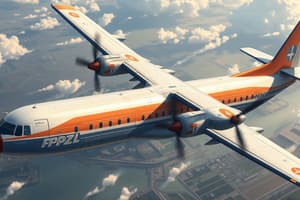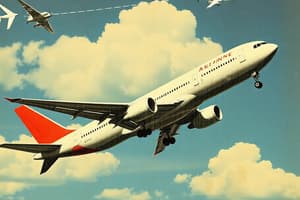Podcast
Questions and Answers
The aviation industry includes commercial airlines, cargo transport, and aerospace __________.
The aviation industry includes commercial airlines, cargo transport, and aerospace __________.
manufacturing
Cargo aviation specifically refers to the transportation of goods and __________ via air.
Cargo aviation specifically refers to the transportation of goods and __________ via air.
freight
Dedicated cargo aircraft are designed specifically for transporting __________.
Dedicated cargo aircraft are designed specifically for transporting __________.
goods
Passenger aircraft can generate additional revenue by utilizing __________ cargo space.
Passenger aircraft can generate additional revenue by utilizing __________ cargo space.
Companies like FedEx and UPS are examples of __________ airlines.
Companies like FedEx and UPS are examples of __________ airlines.
Air freight is faster than ocean freight but generally more __________.
Air freight is faster than ocean freight but generally more __________.
Load factors measure how efficiently a cargo airline fills its __________.
Load factors measure how efficiently a cargo airline fills its __________.
The International Air Transport Association (IATA) sets __________ for air cargo operations.
The International Air Transport Association (IATA) sets __________ for air cargo operations.
High operational costs in cargo aviation can be attributed to fuel, maintenance, and __________ fees.
High operational costs in cargo aviation can be attributed to fuel, maintenance, and __________ fees.
Technological advancements in cargo aviation include automation and real-time tracking __________.
Technological advancements in cargo aviation include automation and real-time tracking __________.
Flashcards are hidden until you start studying
Study Notes
Overview of Aviation and Cargo
-
Aviation Industry: Encompasses all aspects of air travel and the operation of aircraft, including commercial airlines, cargo transport, and aerospace manufacturing.
-
Cargo Aviation: Refers specifically to the transportation of goods and freight via air. It includes dedicated cargo airlines, as well as belly cargo from passenger flights.
Types of Cargo Aircraft
-
Dedicated Cargo Aircraft:
- Designed specifically for transporting goods.
- Features include large cargo doors, reinforced floors, and flexible cargo configurations.
-
Passenger Aircraft with Belly Cargo:
- Utilize available space in the hold beneath passenger cabins.
- Commonly used by commercial airlines to maximize revenue.
Key Players in Cargo Aviation
-
Cargo Airlines: Companies focused solely on cargo, e.g., FedEx, UPS, DHL.
-
Integrated Carriers: Combine logistics and transportation services, providing door-to-door delivery.
-
Freight Forwarders: Intermediaries who arrange for the transportation of goods on behalf of shippers.
Key Concepts
-
Air Freight: The shipping of goods via air transport. Faster than ocean freight but more expensive.
-
Load Factors: A measure of how efficiently a cargo airline fills its capacity and generates revenue.
-
Global Trade: Air cargo is critical for international trade, offering speed and reliability for high-value and time-sensitive goods.
Regulations and Standards
-
International Air Transport Association (IATA): Sets standards for air cargo operations to ensure safety, efficiency, and sustainability.
-
Customs Regulations: Governs the cross-border movement of goods, requiring proper documentation and adherence to laws.
Challenges in Cargo Aviation
-
Cost: High operational costs due to fuel, maintenance, and airport fees.
-
Capacity Constraints: Limited availability of cargo space, particularly during peak seasons.
-
Security Regulations: Stringent measures to ensure the safety of air cargo, affecting handling times and processes.
Technological Advancements
-
Automation: Use of drones and automated systems for delivery and logistics management.
-
Tracking Systems: Real-time tracking of shipments enhances visibility and customer service.
-
Sustainability Initiatives: Development of eco-friendly aircraft and efficiency improvements to reduce carbon footprint.
Future Trends
-
E-commerce Growth: Increased demand for air cargo due to rising online shopping.
-
Blockchain Technology: Potential to enhance transparency and efficiency in cargo logistics.
-
Green Initiatives: Focus on reducing emissions and sustainable practices in the aviation industry.
Overview of Aviation and Cargo
- Aviation includes all aspects related to air travel, encompassing commercial airline operations, cargo transport, and aerospace manufacturing.
- Cargo aviation specializes in the transport of goods and freight by air, with operations handled by dedicated cargo airlines and passenger-owned belly cargo.
Types of Cargo Aircraft
- Dedicated cargo aircraft are specifically engineered for goods transport, featuring large cargo doors, reinforced flooring, and versatile cargo configurations.
- Passenger aircraft equipped with belly cargo utilize the space beneath passenger cabins to accommodate additional freight, helping airlines optimize revenue.
Key Players in Cargo Aviation
- Cargo airlines such as FedEx, UPS, and DHL focus exclusively on freight services.
- Integrated carriers provide comprehensive logistics solutions, offering door-to-door delivery along with transportation.
- Freight forwarders act as intermediaries to help shippers arrange transportation for their goods.
Key Concepts
- Air freight is faster than ocean freight for shipping goods, but it incurs higher costs.
- Load factors indicate how well a cargo airline is utilizing its capacity to generate revenue.
- Air cargo plays a crucial role in global trade, ensuring swift and reliable delivery of high-value and time-sensitive products.
Regulations and Standards
- The International Air Transport Association (IATA) establishes operational standards for air cargo to promote safety, efficiency, and sustainability.
- Customs regulations dictate proper documentation and compliance for the cross-border movement of goods.
Challenges in Cargo Aviation
- High operational costs stem from expenses related to fuel, maintenance, and airport fees.
- Capacity constraints arise from limited cargo space, especially during peak times, which affects service availability.
- Stringent security regulations are in place to ensure the safety of air cargo, often complicating handling processes and increasing time requirements.
Technological Advancements
- Automation in cargo aviation includes the use of drones and automated systems for improved delivery and logistics management.
- Advanced tracking systems provide real-time visibility of shipments, enhancing customer service experience.
- Sustainability initiatives focus on developing eco-friendly aircraft and implementing efficiency measures to minimize the carbon footprint of air operations.
Future Trends
- Growth in e-commerce is leading to a heightened demand for air cargo as online shopping continues to rise.
- Blockchain technology presents opportunities for improving transparency and efficiency in cargo logistics operations.
- Green initiatives emphasize efforts to reduce emissions and promote sustainable practices in the aviation sector.
Studying That Suits You
Use AI to generate personalized quizzes and flashcards to suit your learning preferences.




